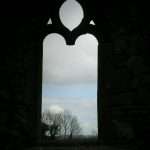Pietro Russell, whose life is narrated in twenty-six episodes in Sebastian Faulks’ novel, A Fool’s Alphabet, visits Jerusalem in 1982. The deep antipathy towards the other he senses in each of the communities leaves him confused; his liberal English upbringing had not equipped him to cope with deep antagonism.
In childhood Pietro had liked to choose a side to support in any debate, even if it turned out to be the ‘wrong’ one – the Roundheads, the Southern States, Sonny Liston, even, when he was older, George McGovern. When a combination of experience and laziness showed him there were seldom easy solutions, he relied on balance as a substitute for commitment.
He began to be depressed in Israel because there seemed to be no ground available for compromise, no way in which all the parties could be even partially right. So whose experience counted for most?
Growing up in the English liberal tradition that shapes the character of Russell, the latitude of the ‘live and let live’ approach to life, understanding exclusive attitudes is not easy. In college days, John Stuart Mill’s ‘Utilitarianism’ was a set text; it provided an introduction to a libertarian tradition where personal liberty was tolerated to the extent that it did not impinge upon the personal liberty of others.
The Protestant tradition has been implicitly libertarian. Allowing a multiplicity of churches is a de facto recognition that no-one possesses the right to prescribe the thinking, or the behaviour, of those who disagree. Being Protestant has been, by implication, an acceptance of relativism: if one accepts that there is a diversity of churches in which each expresses a facet of the truth, then one accepts that no single tradition possesses all, or absolute, truth. Like Russell, our tradition has been pragmatic, deriving conclusions from experience, looking for balance in arguments, in order that we not stray down the path of autocracy.
Within the church, the libertarian and relativist tradition, a tradition that that allowed the emergence of Western democratic capitalist society, is now under threat. The battle ground chosen by those whose vision is of an exclusive and prescriptive church is sexuality; it could be any of a range of issues. A tiny number of biblical texts are adduced in support a view of human relationships and family life that owes more to the social arrangements that emerged from the Industrial Revolution than it does to anything in Scripture.
Claiming to possess the truth, sections of the church now seek to prescribe how others should live their private lives. It is an attitude far removed one that seeks after balance and far removed from the writings of J.S. Mill. It leaves an ageing English liberal feeling depressed.
